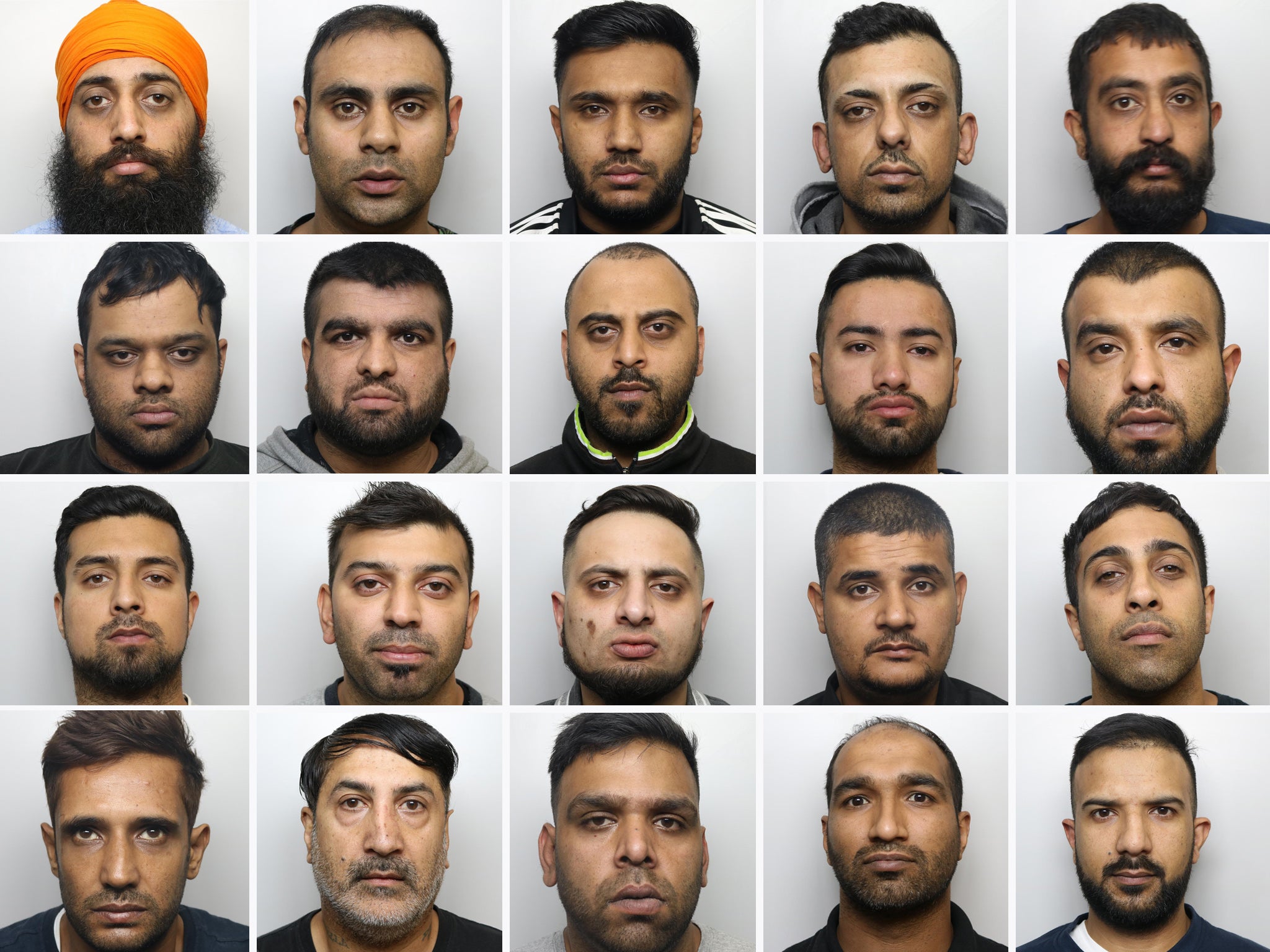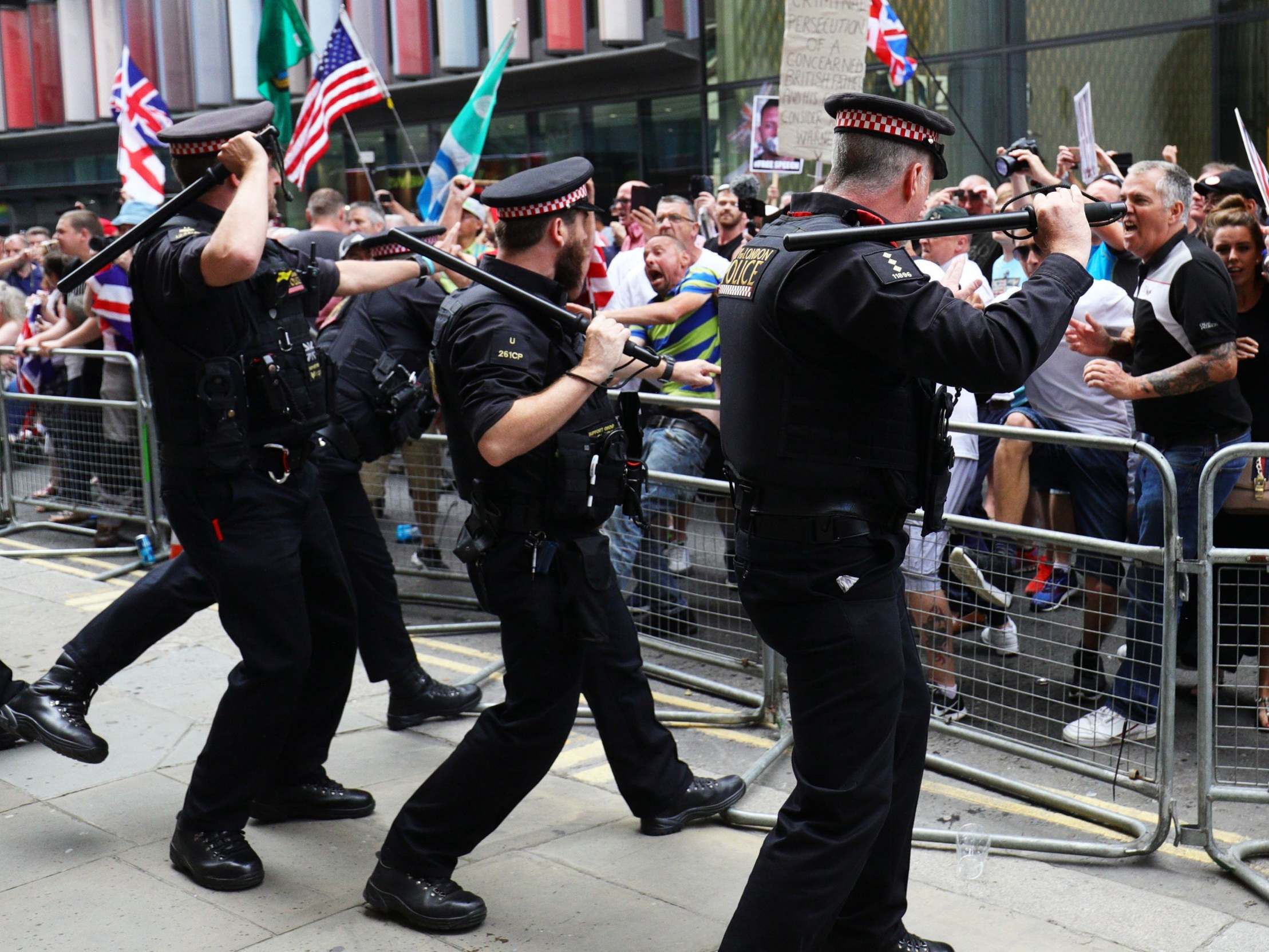Tommy Robinson caused Huddersfield grooming gang member to appeal conviction, court ruling reveals
Judges say Robinson ‘encouraged vigilante action’ with video and called his changing account of events ‘not credible’
Tommy Robinson caused a Huddersfield grooming gang member to appeal his rape conviction, it has been revealed.
Faisal Nadeem, nicknamed “Chiller”, argued his trial had been prejudiced by Robinson’s Facebook live video outside Leeds Crown Court and the protests that followed his imprisonment.
Nadeem, 32, had been jailed for 12 years for rape and supplying class A drugs in the second of three linked trials covered by a blanket reporting restriction.
A Court of Appeal judge refused Nadeem permission to appeal in November after his lawyer attempted to have the jury discharged over Robinson’s video.
Another member of the gang, child rapist Sajid Hussain, fled days after the Facebook live video was broadcast.
Court documents said he absconded on 1 June 2018, amid a “large demonstration by the English Defence League” outside Leeds Crown Court protesting Robinson’s imprisonment.
Hussain’s defence lawyer “had expressed concern on his behalf about the demonstration, which had been advertised in advance” by Robinson’s supporters.
The anti-Islam activist was found to have committed contempt by High Court judges, who found he had also “encouraged vigilante action” in the Facebook live broadcast.
A full judgment released on Tuesday revealed new details of the case, while criticising Robinson’s “implausible” attempts to deny contempt of court.
As well as Nadeem’s bid to overturn his conviction, the judgment revealed a second application to discharge the jury was lodged on 4 June 2018 because of demonstrations over Robinson’s original imprisonment.
That sentence was quashed because of procedural failings last August, but Robinson – whose real name is Stephen Yaxley-Lennon – faces returning to jail after a fresh sentencing hearing on Thursday.
On Monday evening, he launched a public appeal for Donald Trump to grant his family “political asylum”. “I beg Donald Trump, I beg the American government, to look at my case,” Robinson said. “I need evacuation out of this country because dark forces are at work.”
He has previously been refused entry to the US because of criminal convictions, including for violence and drug possession, and was jailed for using a friend’s passport to travel to New York illegally in 2012.
When he started his livestream outside Leeds Crown Court on 25 May 2018, Robinson was already under a suspended sentence for committing contempt of court at a rape trial in Canterbury.

Robinson’s Facebook page, which has since been deleted, was followed by 1.2 million people at the time and Robinson regularly encouraged followers to share it until it reached 10,000 live views.
The High Court judgement said Robinson stated the defendants’ names and charges, and that the jury was delivering their verdicts in the second of three linked trials.
“He referred in derogatory terms to the ethnic and religious backgrounds and associations of the defendants,” judges said. “He gave graphic and disturbing examples of other historic sexual offences committed by Muslim men and suggested that ‘sexual slaves’ are permitted, if not encouraged, by Islam as a religion.”
Judges said Robinson confronted several defendants entering court, following them and filming them while “questioning them in provocative and aggressive terms”.
Mr Justice Warby and Dame Victoria Sharp said the English Defence League founder also incited viewers to harass the defendants, citing a passage where he said: “Harass him, find him, go knock on his door, follow him, see where he works, see what he’s doing.” The judges found that in different parts of the video, Robinson “approves and encourages vigilante action”.
Robinson denied encouraging harassment and claimed to have been criticising the media’s behaviour towards him, but the judges said he was “engaged in the agitation of members of the public in respect of what he presented as a serious threat to society”.
“His words had a clear tendency to encourage unlawful physical or verbal aggression towards identifiable targets,” the judgment added. “There was plainly a real risk that the defendants awaiting jury verdicts would see themselves as at risk, feel intimidated, and that this would have a significant adverse impact on their ability to participate in the closing stages of the trial.”
The High Court found that Robinson had committed contempt by risking a “serious impediment to the course of justice” with the video, and “interfering with the administration of justice” by the way he filmed outside Leeds Crown Court.

Judges said he also violated a reporting restriction imposed under the Contempt of Court Act to postpone reports of the Huddersfield grooming gang trials until the last one had concluded.
They noted Robinson had stated “there is a reporting restriction on this case” during his Facebook live video, but later claimed to be unaware of the terms as his account “developed and changed” through successive court hearings.
Judges said he did not claim to have asked court staff about the ban until a witness statement on 22 October – five months after being jailed – forcing the Old Bailey judge who had been due to hear the case to refer it to the attorney general for evidential investigation.
“The version of events the respondent [Robinson] has now put before us is more elaborate still, adding significant details that were not mentioned before,” the High Court judgement said, detailing new claims that Robinson’s assistant checked the court door and screens for a reporting restriction notice.
But judges said there was “no opportunity for the respondent’s colleague to do these things before the livestreaming began” at 8.32am because the court building was not open to the public. “The account he now gives is not credible,” the judgment said. “We are entirely satisfied that the respondent had actual knowledge that there was an order in force restricting reporting of the trial.”
Judges criticised Leeds Crown Court staff for failing to display the order on a court noticeboard, door or screens, but said Robinson was “reckless” for not following a security guard’s advice to check with clerks.
Robinson has repeatedly claimed other media organisations go unpunished for committing contempt of court, but the High Court found that such breaches are “extremely rare”, adding: “This is doubtless because professional journalists reporting on legal proceedings are generally well informed, careful and well advised.”
Judges also threw out arguments that proceedings against Robinson violated freedom of expression, saying it was outweighed by “interference with fair trial rights”.
“The rule of law demands that those who act in such a way as to subvert due process should be held to account, whether or not they actually threaten the fairness of the end result,” they concluded. “These are essential principles which must be given weight in a democratic society.”

